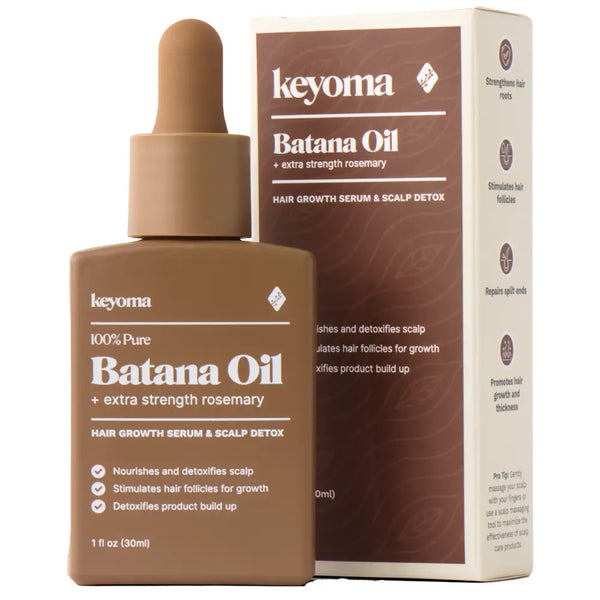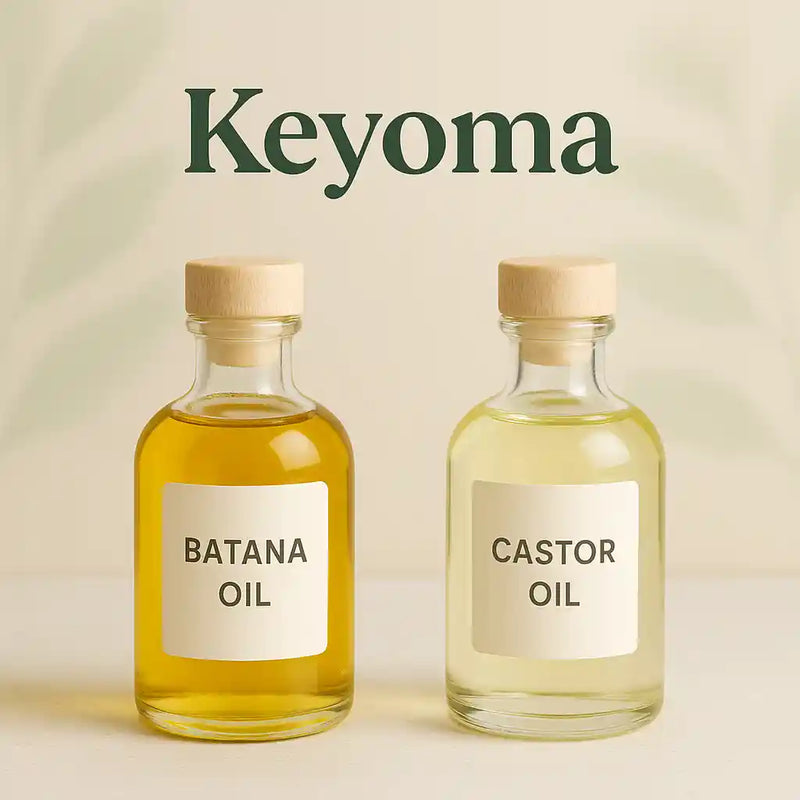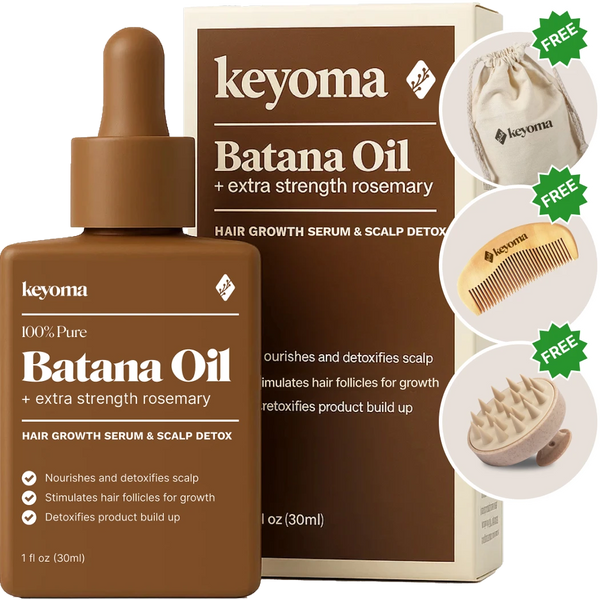In this article
Picking the right oil for your hair and skin comes down to what you truly need. Batana oil and castor oil offer different strengths. Some people wonder which one really helps hair grow. Others are curious if batana oil is safe for the skin or if castor oil can cause acne.
This comparison will show you how each oil brings unique benefits to your scalp, face, and hair health. But the answer is not always simple. You are not the only one who has tried to figure this out and felt unsure along the way.
And if you have struggled with dryness, thinning hair, or skin irritation, this guide can help you find a gentle, useful option that fits your routine.
What’s the Difference Between Batana Oil and Castor Oil?

Batana oil and castor oil are not the same. They come from different sources and they work in different ways. Batana oil is made from the American palm tree. It has been trusted by the Miskito people for generations.
This oil is packed with vitamin E and fatty acids that help soften and hydrate both hair and skin. It is light and feels smooth. Castor oil comes from castor beans. It is known for its thick, sticky texture and its ricinoleic acid content, which helps support follicle health and can fight scalp bacteria.
Some people also ask about the scent. Batana oil smells nutty and earthy. Castor oil is more neutral but can sometimes smell a little sharp. Some people find the batana scent comforting. Others like the simple, quiet smell of castor oil.
Both oils can help support hair growth and scalp care, but they work differently. Batana oil focuses on deep moisture and natural shine. Castor oil works more on scalp stimulation and building thickness.
And choosing between them really depends on what your hair and skin need the most.
Benefits for Skin and Face

People often think of hair oils as something only for the scalp and strands, but both batana oil and castor oil can do good things for your skin and face too. These oils are not only about hair. They also bring moisture, protection, and calm support to dry or stressed skin.
Some people ask if batana oil is safe to put on the face. Others worry that castor oil might clog pores. And those are smart questions to ask.
If your skin is sensitive, it is always a good idea to start slowly and see how your skin feels with either oil. This section will give you clear answers, without guesswork, to help you decide what works best for you.
Moisturizing Effects
Batana oil gives deep hydration and softens dry skin quickly. It sinks in nicely without leaving that sticky, uncomfortable layer behind. People often say batana oil keeps their skin feeling nourished for hours.
Castor oil also brings strong moisture, but it feels heavier and thicker on the skin. It usually creates a coating that locks in hydration, which can feel greasy to some people. If your skin clogs easily, you might find castor oil a bit too much.
Both oils can help with dryness. But batana oil often feels lighter and more comfortable for most skin types. And if you are looking for moisture that lasts without the heavy texture, batana oil is often the better pick.
Acne and Comedogenic Rating
Batana oil is low on the comedogenic scale. It rarely clogs pores. Many people with acne-prone skin say batana oil feels light and sinks in without causing breakouts. It is often a good choice for those who need moisture but do not want to risk clogged pores.
Castor oil is moderate to high on the comedogenic scale, which means it can block pores for some users. It feels thick and is slower to absorb. Some people notice that castor oil leads to more breakouts when they use it on their face.
Both oils have their place. But if your skin is sensitive or prone to acne, batana oil is usually the safer option. Castor oil can still work on tougher skin areas like elbows or knees, or if you use it carefully in small amounts.
Anti-Inflammatory Potential
Batana oil offers natural antioxidants and soothing support that help calm irritated skin. Many people use it to ease redness, dryness, and itchiness. It feels light and is gentle enough for daily use, even on sensitive skin.
Castor oil also has anti-inflammatory properties, especially for scalp problems like dandruff or minor infections. It creates a thick layer that can protect the skin, but sometimes that weight feels too much, especially for inflamed or acne-prone areas. If you are working with sensitive skin, the heaviness of castor oil might not feel right.
Both oils can help the skin recover, but they do it in different ways. Batana oil focuses on comfort and hydration. Castor oil is better at sealing in healing, especially on the scalp or tougher skin spots. And finding what feels good for you is what matters most.
When and How to Apply (Day vs. Night Use)
Batana oil works well during both the day and night. Its lightweight texture sinks in fast without leaving your skin or hair feeling greasy. You can easily use batana oil in the morning for daily moisture or apply it at night for deeper hydration. And if you like a soft, clean feel without stickiness, batana oil fits smoothly into your daytime routine.
Castor oil is usually better for nighttime use. Its thick, heavy texture takes much longer to absorb and can feel too greasy if you put it on during the day. Many people like using castor oil as an overnight scalp treatment or as a heavy layer to seal in moisture on extra-dry skin. If you are in a rush in the morning, castor oil can feel like too much to deal with.
Both oils can work in different ways, but batana oil is more comfortable for daytime use, and castor oil often feels better as a night treatment.
Hair Growth, Scalp Health, and Repair
Understanding how batana oil and castor oil help with hair growth and scalp repair can make a big difference when comparing these two oils. Both can strengthen hair and improve scalp health, but they work in unique ways.
Some people wonder if batana oil is better for hydration. Others want to know if castor oil really helps with thickening. This section will break it down so you can figure out what works for you.
And if you have tried plenty of products that did not work, this comparison can give you a fresh, honest path to healthier hair.
Why People Choose Batana Oil for Hair

Batana oil is known for providing rich scalp hydration. It gives deep moisture without leaving your hair feeling heavy or greasy. And people really like that batana oil helps keep the scalp healthy and balanced, which can support overall hair health.
It also makes a big difference in hair softness. Regular use can leave your hair feeling smooth, less brittle, and easier to manage. If you have been dealing with dryness or rough texture, batana oil might bring some much-needed comfort to your hair care routine.
Another thing people notice is the natural shine it gives to hair. It does not sit on top of your hair like heavier oils. Instead, it helps your hair look healthy and well-nourished. If your hair has lost its shine, this oil can be a simple, practical way to bring it back.
Why People Choose Castor Oil for Hair
Castor oil is known for stimulating hair follicles and helping encourage new growth. Many people reach for it when they are trying to fill in thinning spots or support healthy regrowth, especially around the edges and crown.
It also works well for hair thickening. The dense texture of castor oil coats the hair, making it look fuller and stronger as you continue using it. If your hair feels weak or thin, you might notice that castor oil gives it that extra bit of volume you have been searching for.
Another reason people use castor oil is because of its anti-fungal properties, which help keep the scalp clean and balanced. It can support the fight against scalp issues like dandruff or mild infections. And if you have been struggling with flaky or itchy scalp problems, castor oil might offer the kind of extra support you have been needing.
Which Oil Works Best for Common Hair Concerns?
When it comes to choosing the right oil for common hair concerns, people often ask whether batana oil or castor oil works better. Both oils can help, but each has its own strengths. This section will walk you through how each oil supports thinning edges, dry scalp, and heat or color damage.
And if you are still unsure which one fits your routine, this side-by-side look can help you decide based on what your hair needs most.
Thinning Edges
Both batana oil and castor oil can help in different ways. Batana oil focuses on nourishing the scalp and improving moisture balance, which may support regrowth over time. Castor oil is widely used for follicle stimulation and may help speed up the regrowth process in thinning areas. If your hairline feels fragile, either oil can be part of your routine.
Dry Scalp or Dandruff
Batana oil’s hydration can relieve tightness and itch, while castor oil’s anti-fungal properties may help keep scalp issues under control. Both oils offer support but from different angles. One focuses on moisture, the other on scalp cleansing.
Heat or Color Damage
Batana oil’s ability to soften hair and restore shine makes it a helpful choice. Castor oil can still help by coating damaged strands, but its thicker texture may feel heavy for those with fine or already stressed hair.
Both oils can be useful, but the best choice depends on whether your hair needs more moisture, stimulation, or protection.
Can You Use Batana and Castor Oil Together?
Yes, you can use batana oil and castor oil together. Blending these oils gives you the benefits of both hydration and scalp stimulation. Batana oil brings moisture, softness, and shine. Castor oil focuses on hair thickening and scalp protection.
People often mix them to soften the thick texture of castor oil with the lighter feel of batana oil. This combination can support hair growth without leaving heavy buildup.
But if you have been unsure whether using both might feel like too much, this blend can actually feel better than using either oil alone. You can adjust the ratio to fit what you need. Add more batana oil if you want softness or more castor oil if you are aiming for stronger follicle support.
How to Choose the Right Oil for You
Choosing between batana oil and castor oil really depends on what your hair and skin need most.
- If you have sensitive skin or fine hair, batana oil is usually the better choice because it feels lighter and is less likely to clog pores.
- Castor oil is thick and tends to work better for people with coarse hair or those who want stronger follicle stimulation.
Your personal goals can help you decide too.
- If you are looking for hydration, softness, and anti-inflammatory support, batana oil covers those needs.
- But if your main goal is hair growth, scalp cleansing, and thickening, castor oil usually gives stronger results.
And you do not always have to choose just one.
- You can combine both oils to make your own blend.
- You can always adjust the mix if you want it to feel lighter or more intense.
If you are not sure where to begin, try making a small batch and see how your hair and skin react. It is all about what feels right for you.
How to Use Batana, Castor, or Both Oils in Your Routine

Once you have chosen the oil that feels right for you, the next step is learning how to use it in a way that fits your routine. You can use batana oil, castor oil, or both, depending on what your hair and scalp need. Both work best when applied directly to the scalp and hair strands so you can get the full benefits.
Here is a simple step-by-step guide to help you get started:
- Start with clean, dry, or slightly damp hair.
- Warm the oil slightly by rubbing it between your palms.
- Apply the oil directly to your scalp and gently massage it in for about 3 to 5 minutes.
- Spread the oil through the rest of your hair, focusing on dry or damaged areas.
- Leave the oil in for at least 30 minutes. You can also leave it overnight if you want a deeper treatment.
- Wash your hair thoroughly with a gentle, sulfate-free shampoo.
- Repeat this routine 1 to 2 times a week to see the best results.
And if you are new to oiling, starting with this simple routine can make it feel less overwhelming and more effective right away.
Try the Real Thing—Start With Pure, Small-Batch Batana Oil
If you are ready to try an oil that brings hydration, softness, and growth together in one simple step, start with Keyoma’s 100% pure batana oil with rosemary. This small-batch oil is made without harsh additives. It delivers real moisture and scalp support that you can actually feel.
And if you have been searching for something simple, clean, and proven, this is a great place to begin. You can shop now and see how pure batana oil fits into your daily routine for stronger, healthier hair.
Featured Product
100% Pure Batana Oil + Rosemary
↓Best Batana Oil to Buy↓
1 Month
Subscribe & Save
- 30-day supply delivered monthly $35
- 30% off for life $6
- Free haircare essentials kit $33
- Free custom wooden comb $10
- Free scalp massager $15
- Free eco-friendly travel bag $8
- 30-Day Money Back Guarantee
- Free Shipping
- Online portal for easy cancel, skip, or pause.
1 Month One Time Purchase

- 30-day supply $50
- 30% off for life $6
- Free haircare essentials kit $33
- Free custom wooden comb $10
- Free scalp massager $15
- Free eco-friendly travel bag $8








